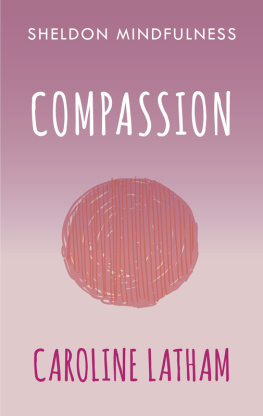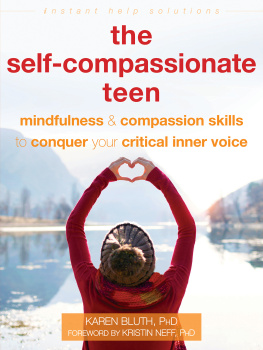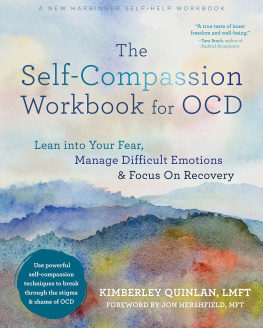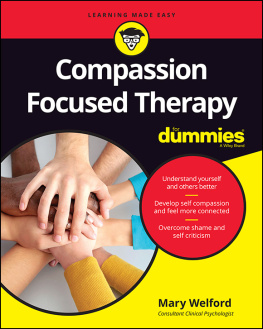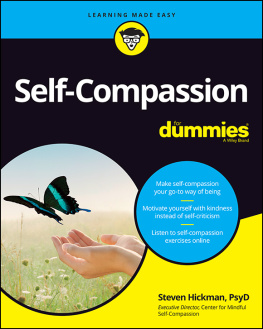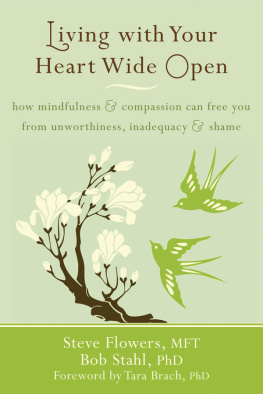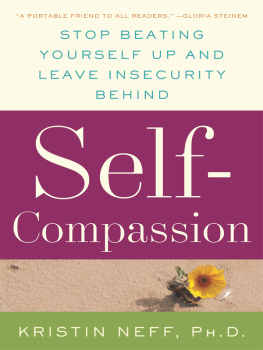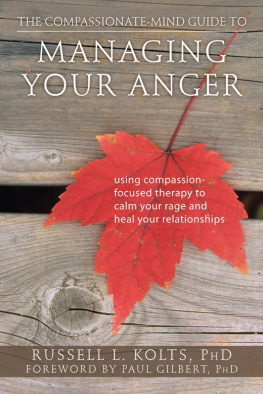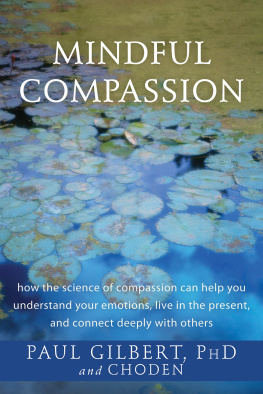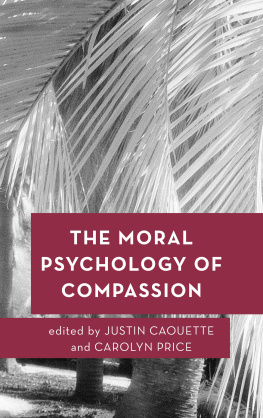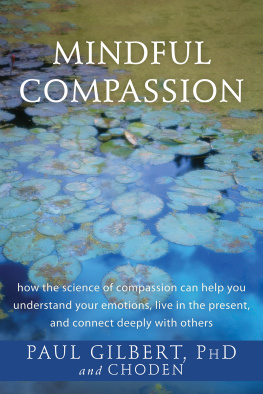
Sheldon Mindfulness
Compassion
Caroline Latham is the author of four books and is currently writing her fifth. She has been a therapist, healer and coach for nearly three decades, both treating individuals from across the globe and running workshops internationally. Caroline has worked with a huge range of clients, has set up a charity (www.canterburytibetlink.org.uk) and has run mindfulness groups for over twenty years. Her Common Sense Therapy accesses the root of clients emotional blocks, and helps to alleviate suffering. Her aim is to benefit those she helps as much as possible.
Sheldon Mindfulness
Anxiety and Depression
Dr Cheryl Rezek
Compassion
Caroline Latham
Keeping a Journal
Philip Cowell
Quit Smoking
Dr Cheryl Rezek
Stress
Philip Cowell and Lorraine Millard
Sheldon Mindfulness
Compassion
CAROLINE LATHAM

First published in Great Britain in 2015 by Sheldon Press
An Hachette UK Company
Sheldon Press
Carmelite House
50 Victoria Embankment
London EC4Y 0DZ
www.sheldonpress.co.uk
Copyright Caroline Latham 2015
All rights reserved. No part of this book may be reproduced or transmitted in any form or by any means, electronic or mechanical, including photocopying, recording, or by any information storage and retrieval system, without permission in writing from the publisher.
The author and publisher have made every effort to ensure that the external website and email addresses included in this book are correct and up to date at the time of going to press. The author and publisher are not responsible for the content, quality or continuing accessibility of the sites.
Every effort has been made to seek permission to use copyright material reproduced in this book. The publisher apologizes for those cases where permission might not have been sought and, if notified, will formally seek permission at the earliest opportunity.
British Library Cataloguing-in-Publication Data
A catalogue record for this book is available from the British Library
ISBN 9781847094087
This book would not have been conceived without the suggestion of my editor, Fiona Marshall, to whom I am deeply grateful.
But my deepest gratitude will always go to my teachers. I would have been on the scrapheap without their guidance, compassion and wisdom. I am so blessed. Jigme Khyentse Rinpoche, this is your copyright.
Gratitude too to Chuck Spezzano, whose words I repeatedly quote. He has told me he wants his work to carry on and I hope his methods will become increasingly widespread, because they work. Thank you for being so funny as well as great at emotional emergency kits!
Finally, gratitude to you, my readers. Know that buying a copy of this book will help many charitable projects and make more peace in the world. Ninety per cent of the books profits are dedicated to (the Kangyur Rinpoche Foundation).
Thank you all!
Sheldon Mindfulness
Compassion
This book has one motivation: to be of benefit to all sentient beings. May it benefit you and everyone else, far and wide, as profoundly and as much as is possible!
My aim has been to write this book in the simplest possible way, because my editor and I really want it to be practical, easy to read and to the point. Simple can be harder than complex is a Steve Jobs quotation I just happened to read... So lets simply keep it simple.
So what is the link between mindfulness and compassion? To be mindful means to be aware. The opposite of mindfulness is being lost in mindless thinking or thoughtless actions. Compassion means being aware of another persons suffering with a deep desire to do something to relieve it. By practising mindfulness, we can develop enough attention to act in such a way as to help others by thinking and then behaving more compassionately.
Nobody has time these days, so Ive tried to be practical and succinct. I hope this will allow you to absorb what all this mindful compassion is about easily and quickly and get to it straight away. That is my wish. Im not suggesting in any way that this is a quick fix. I would like to help set you on the path of training your mind in the most compassionate way in order to discover its true nature and its true power. It can take a lifetime to master the techniques included within these pages. But you can start where you are right now and stop where youre not.
I have been practising meditation, mindfulness and compassionate mind training for over a quarter of a century now, and have done some form of practice every day except one. I clearly remember that particular day. It was not a good day.
Therefore I can vouch for the efficacy of these practices. I have been fortunate to be taught them by some of the best teachers in the world, people who are living and constant embodiments of compassion. I owe my teachers everything. All that is helpful in this book comes from them. Anything that is unhelpful comes from me.
I have also been fortunate to be able to pass these practices on to thousands of people from every background over several decades. Some have taken them up with alacrity, while many others have let them fall by the wayside, but it is fair to say that those who have kept them up report that their lives have been transformed and say how very much better they feel.
This is important.
There are benefits to these practices and they are evident. The greatest benefit is becoming calmer and feeling happier. Other benefits include lower blood pressure, greater longevity, fewer wrinkles, more energy, less need for sleep, greater efficiency and improved memory (although personally I havent noticed that one yet).
In my capacity as a therapist and healer over a career spanning nearly 30 years, I have picked up a helpful trick or two. These can help when mindfulness or the ability to practise appears to be blocked. They are not the ultimate solution but they are an aid along the way. My aim in this book is to distil what I have learnt from my years of mind training and therapeutic practice into the most essential methods to help you to begin to train your mind in the techniques of mindful compassion.
Read this book. Try out all the exercises. Come back at the end of the year and let me know whether or not you have felt the benefit. If it has so much as turned you a thumbnail away from unhappiness, it is a thumbnails worth in the right direction. As with anything, it requires effort. (Effort is not everyones favourite word but it sounds much more appealing than discipline.) If at first you dont succeed, try and try again.
Not that there is a success to be achieved. The success I am talking about means letting go of the wish to be successful and accepting everything as being perfect as it is. Success, in this case, means freedom. It is true, though, that to be good at anything you have to keep at it. Perhaps this quotation is better: Do a little more than is easy and a little less than is hard.
Please dont class yourself as one of those people who simply cant do it. Oh, Ive tried that meditation stuff, and its just not for me. Ive heard that a lot, but it can be just an excuse for you to stay stuck where you are. Its a bit like saying you wont like baked beans when youve just looked at the tin on the shelf in the supermarket. Or refusing to keep on taking the medicine when youve just swallowed one pill of a course of antibiotics because its not working. You dont know which bit is going to work, even though the doctor has told you how important it is to complete the course.
Next page
